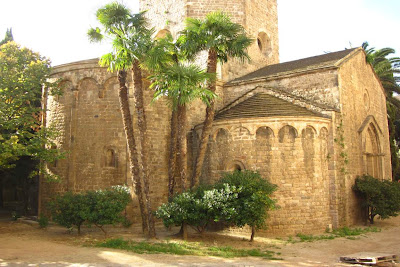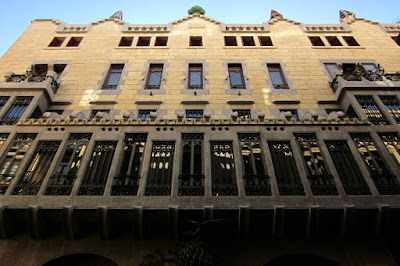Today I would like to suggest you a route through El Raval, a really lively district located beside the Gothic Quarter which has become a pole of attraction for people from all over the world.
Barcelona’s Raval neighbourhood is now bounded by La Rambla, Carrer Pelai, the Ronda Sant Antoni, Ronda Sant Pere and the Paral·lel. These ancient Roman roads marked out the boundaries of the walls which were demolished so that the rapidly growing city could expand.
Within these perimeters, this area, which had been the site of fields and convents until the mid-19th century, saw the construction of textile mills and workers’ houses. As a result of its industrialisation and proximity to the port, the Raval became a neighbourhood with a high immigrant population, where social problems were commonplace.
The efforts made by Barcelona City Council since the 1990s to clean up and improve living conditions in Raval neighbourhood have given the Raval back its reputation and prestige.
The most important places we will visit in this route are:
- Sant Pau del Camp Convent
- Rambla del Raval
- Palau Güell
- Hospital de la Santa Creu
- El Indio
- MACBA Museum
Sant Pau del Camp
This small Romanesque convent along the Carrer de Sant Pau is a truly peaceful place, away from the noise and bustle of Barcelona’s Raval neighbourhood
Sant Pau del Camp Convent is one of Barcelona city’s oldest surviving churches which was part of an ancient Benedictine monastery. Built in the Lombard Romanesque style, this jewel of the Raval has endured attacks and reconstructions. Indeed, the monastery’s church and cloister are in an extremely good state of repair, and only the octagonal bell tower has been partially destroyed
The main doorway of Sant Pau’s church, with its romanesque arch
The entrance doorway has two columns with ancient marble Visigothic capitals, while in the tympanum is depicted Christ in Majesty with Saints Paul and Peter
The simple structure of the church, with its cross-shaped ground plan and three apses, has simple decorations along the top of the row of blind arches around the outside, which are underpinned by head-shaped reliefs
Rambla del Raval
La Rambla del Raval is a perfect place to have a drink
Palms in La Rambla del Raval, one of the most lively places in El Raval
Palau Güell
Main facade of El Palau Güell. In Palau Güell, Antoni Gaudí combined the typical square structure of Catalan medieval palazzos and exquisite wooden coffered ceilings with innovations such as the parabolic arch which became a hallmark of his work
Front entrance allowed horse drawn carriages to enter the home through one door and exit through the other. These iron gates feature a parabolic arch and intricate patterns of forged iron-work resembling seaweed and, in some parts, a horsewhip
Typical Building in El Raval
Typical building in El Raval
Hospital de la Santa Creu
The former Hospital de la Santa Creu is one of the finest examples of Catalan civil-Gothic architecture. Building work began in 1401, with the purpose of bringing together Barcelona’s six hospitals on one site
Today, as we enter the Biblioteca de Catalunya, housed on the first floor of the building of the picture, we discover an open-plan space without columns: the hospital wards were located here
Main facade of the current Escola Massana inside El Hospital de la Santa Creu
The quiet garden of El Hospital de la Santa Creu is a fantastic place to forget the stressful pace of the city between orange trees and acacias
Dissecting table in the anatomical amphiteather of La Reial Academia de Cirurgia i Medicina, also located inside El Hospital de la Santa Creu
View from the doorway of the anatomical amphiteather, the most important in Europe
El Indio
Main façade of El Indio, a popular store in El Raval decorated according to the modernist style (Carrer del Carme 24)
A catalog of El Indio of 1935
An ancient typewriter and a sewing machine yoy can see inside El Indio
MACBA (Contemporary Art Museum)
In front of MACBA there is a large square where skaters try to improve their skills with the skateboard
The MACBA is also a perfect scenery to have a drink in one of the nearby restaurants
I hope you enjoyed this route. Other interesting routes in Barcelona are:
- Gothic Quarter Route
- Modernism Route
- Gaudí Route
- Montjuïc route
- Route along the Marina and Beach of Barcelona
Finally, clicking on the next link you will find links to other beautiful places in Barcelona.




















